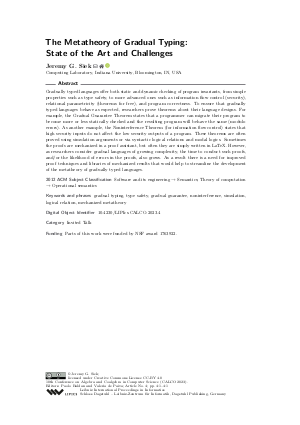The Metatheory of Gradual Typing: State of the Art and Challenges (Invited Talk)
Author
Jeremy G. Siek 
-
Part of:
Volume:
10th Conference on Algebra and Coalgebra in Computer Science (CALCO 2023)
Part of: Series: Leibniz International Proceedings in Informatics (LIPIcs)
Part of: Conference: Conference on Algebra and Coalgebra in Computer Science (CALCO) - License:
 Creative Commons Attribution 4.0 International license
Creative Commons Attribution 4.0 International license
- Publication Date: 2023-09-02
File

PDF
LIPIcs.CALCO.2023.4.pdf
- Filesize: 328 kB
- 1 pages
Document Identifiers
Subject Classification
ACM Subject Classification
- Software and its engineering → Semantics
- Theory of computation → Operational semantics
Keywords
- gradual typing
- type safety
- gradual guarantee
- noninterference
- simulation
- logical relation
- mechanized metatheory
Metrics
- Access Statistics
-
Total Accesses (updated on a weekly basis)
0PDF Downloads0Metadata Views
Abstract
Gradually typed languages offer both static and dynamic checking of program invariants, from simple properties such as type safety, to more advanced ones such as information flow control (security), relational parametricity (theorems for free), and program correctness. To ensure that gradually typed languages behave as expected, researchers prove theorems about their language designs. For example, the Gradual Guarantee Theorem states that a programmer can migrate their program to become more or less statically checked and the resulting program will behave the same (modulo errors). As another example, the Noninterference Theorem (for information flow control) states that high security inputs do not affect the low security outputs of a program. These theorems are often proved using simulation arguments or via syntactic logical relations and modal logics. Sometimes the proofs are mechanized in a proof assistant, but often they are simply written in LaTeX. However, as researchers consider gradual languages of growing complexity, the time to conduct such proofs, and/or the likelihood of errors in the proofs, also grows. As a result there is a need for improved proof techniques and libraries of mechanized results that would help to streamline the development of the metatheory of gradually typed languages.
Cite As Get BibTex
Jeremy G. Siek. The Metatheory of Gradual Typing: State of the Art and Challenges (Invited Talk). In 10th Conference on Algebra and Coalgebra in Computer Science (CALCO 2023). Leibniz International Proceedings in Informatics (LIPIcs), Volume 270, p. 4:1, Schloss Dagstuhl – Leibniz-Zentrum für Informatik (2023)
https://doi.org/10.4230/LIPIcs.CALCO.2023.4
BibTex
@InProceedings{siek:LIPIcs.CALCO.2023.4,
author = {Siek, Jeremy G.},
title = {{The Metatheory of Gradual Typing: State of the Art and Challenges}},
booktitle = {10th Conference on Algebra and Coalgebra in Computer Science (CALCO 2023)},
pages = {4:1--4:1},
series = {Leibniz International Proceedings in Informatics (LIPIcs)},
ISBN = {978-3-95977-287-7},
ISSN = {1868-8969},
year = {2023},
volume = {270},
editor = {Baldan, Paolo and de Paiva, Valeria},
publisher = {Schloss Dagstuhl -- Leibniz-Zentrum f{\"u}r Informatik},
address = {Dagstuhl, Germany},
URL = {https://drops.dagstuhl.de/entities/document/10.4230/LIPIcs.CALCO.2023.4},
URN = {urn:nbn:de:0030-drops-188019},
doi = {10.4230/LIPIcs.CALCO.2023.4},
annote = {Keywords: gradual typing, type safety, gradual guarantee, noninterference, simulation, logical relation, mechanized metatheory}
}
Author Details
Funding
Parts of this work were funded by NSF award 1763922.
